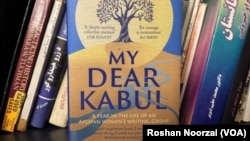WASHINGTON — Marie Bamyani was in a taxi in Kabul on Aug. 15, 2021, when she learned that the Taliban had entered the Afghan capital.
"I felt like a glass that breaks at once," said Bamyani, who is now 29.
At the time, Bamyani worked with a German aid organization.
She said she was too young in the 1990s to remember much about the previous period of Taliban rule.
The only thing that came to her mind were horrific images in the media of the Taliban executing a woman in a soccer stadium in the late '90s.
For her, the return of the Taliban meant "death for Afghan women."
The Taliban quickly imposed repressive measures against women. In a state of shock, Bamyani remembers not daring to step outside of her house for weeks. "I was feeling numb," she told VOA.
The only thing she did was share her experience in a WhatsApp chat group with 20 other women.
Those messages, collected over that first year of Taliban rule and translated into English from Dari and Pashto, are now published as a diary in the book, My Dear Kabul.
Published in 2024 in Britain, the book captures firsthand the changes to women's freedoms seen in the first year, and for some, their thoughts watching the situation in Afghanistan from overseas.
For Bamyani, she continued contributing to the chat group even after being evacuated to Germany in October of that year.
"We just shared our feelings about the situation in the country," she said, adding that they never thought the messages would one day be a book.
The women were part of a writer development program, started in 2019 by Untold Narratives. At the time of the takeover, they were preparing to release a separate book, My Pen Is the Wing of a Bird. That book, released in 2022, is a collection of short fiction stories, written by Afghan women.
Lucy Hannah, the founder of Untold Narratives and a coeditor of My Dear Kabul, told VOA that the WhatsApp messages were collected at the writers' request.
"It is important to hear from women's voices," said Hannah. It is also important to hear "from voices that are not necessarily journalists, that are working people whose lives are directly affected by what is going around them who also happen to be creative writers."
She said that the 21 contributors, ages 22 to 65, were from different ethnic groups.
Another contributor, Fatima Saadat, told VOA that she and the women in the chat wanted a safe place to share, without hesitation, "what came to their mind at that moment."
Saadat left Kabul a week before the fall of Kabul, to start on her master's degree in women's and gender studies as a Fulbright scholar in the U.S.
"I couldn't believe that in a few days after I left, something like that would happen," she said. "I wanted to know how the girls [in the group] were doing."
Saadat said it was "an act of courage" that these women posted what they were feeling and experiencing.
"This encouraged me when I read their messages, and I started [sharing] my feelings while in the U.S.," she said.
"As a woman, my fear was about my human rights, women's rights," she said. "The return of the Taliban meant the return of conflict, horror and backwardness to Afghanistan."
It is painful when one can't get an education, leave the house, and make choices in life, said Saadat. "Your life becomes a prison."
Since the August 2021 takeover, the Taliban have imposed rules and regulations on women and girls: They are barred from secondary and university education, working with the government and non-government organizations, traveling long distances without being accompanied by a male relative, and going to public baths and restaurants.
But, Saadat said, "Writing is the thing that the Taliban can't take away from us."
Other Afghan female writers have welcomed the book's release.
Parvin Malal, who writes poetry and fiction about women, conflict and refugees, told VOA it is important for Afghan women to write about their experiences.
Writing helps people when "going through crises and dealing with mental issues," said Malal, who is originally from Kandahar.
In a December report, Rawadari, an Afghanistan-focused rights group based outside the country, found deterioration of mental health and an increase in suicide attempts and child and forced marriages among girls in Afghanistan.
"As a result of the ban on women's education, violence against women increased, which has made life difficult for girls and women" in Afghanistan, the report said.
For Bamyani, she believes the current situation in Afghanistan will not remain the same.
"I am optimistic and hopeful that it will not be forever, but I hope that people inside Afghanistan will not suffer for long," she said.





Forum